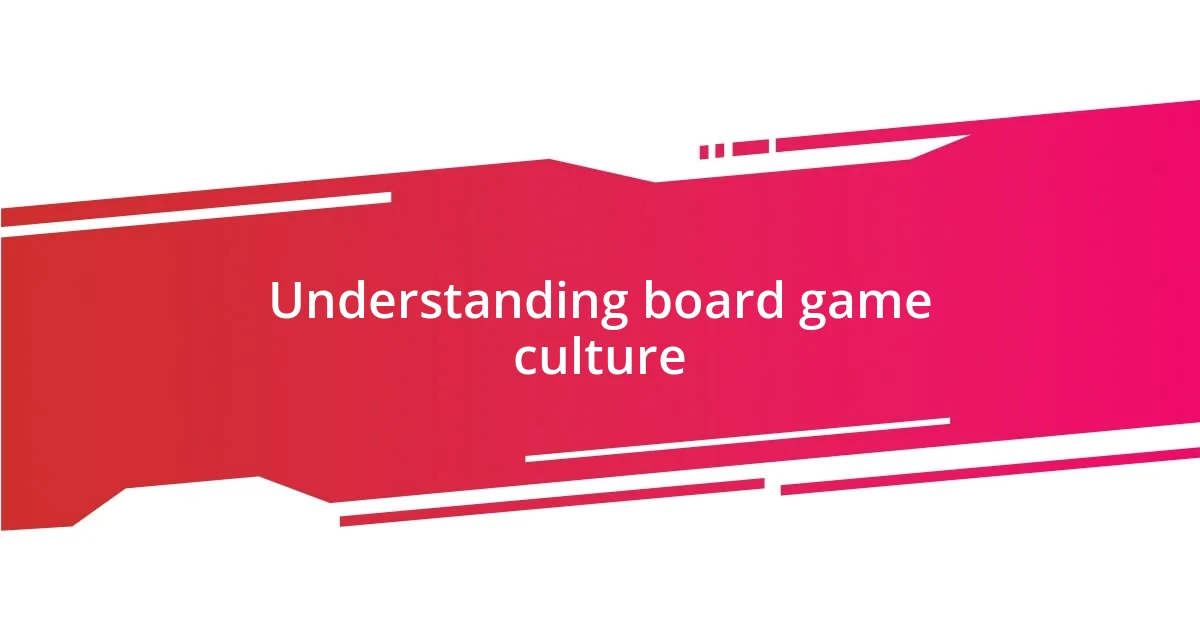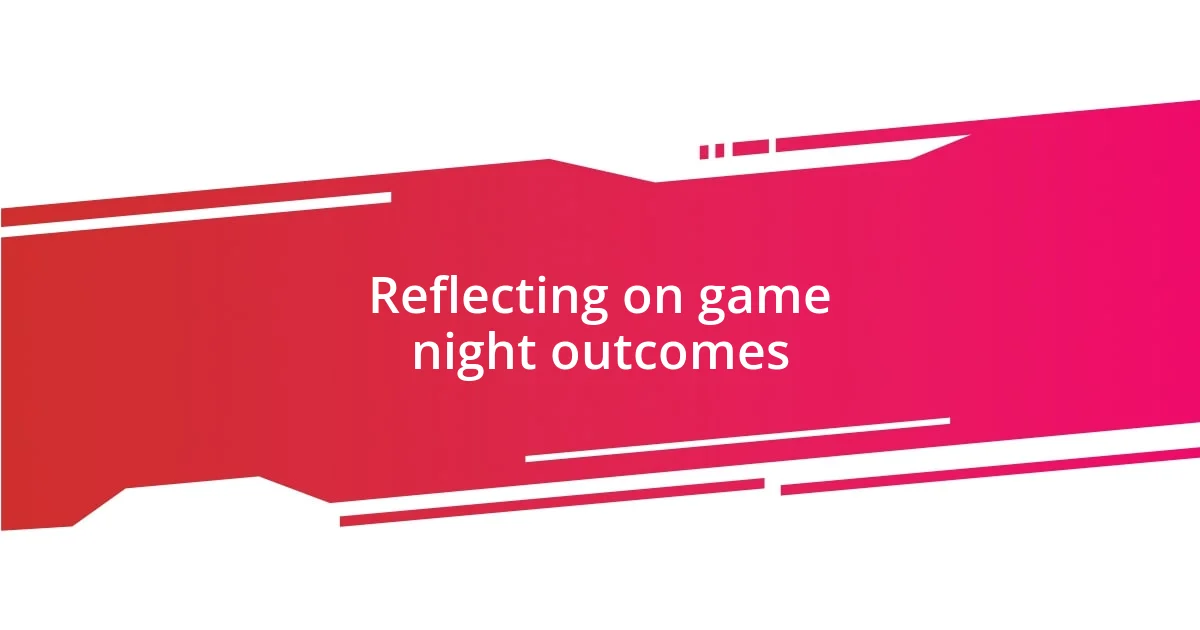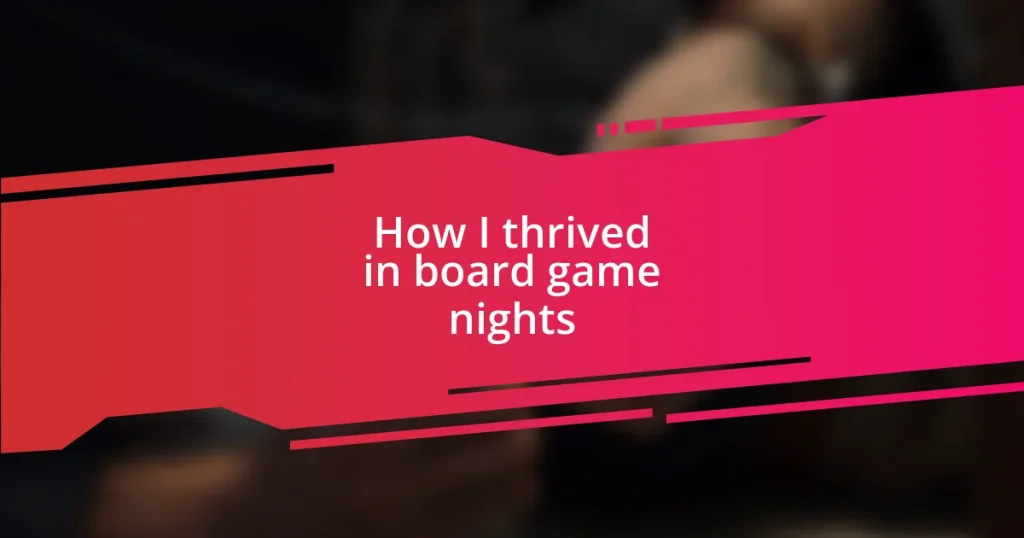Key takeaways:
- Board game culture fosters social connections and generational bonding, enhancing shared experiences through laughter and storytelling.
- Choosing the right games tailored to player count, experience level, and group dynamics is crucial for a successful game night.
- Engagement and adaptability during gameplay can significantly influence outcomes, with reflection on game nights fostering deeper connections and insights among players.

Understanding board game culture
Board game culture is like a vibrant tapestry woven from diverse threads of social interaction and shared experience. I remember the first time I joined a weekly game night; it was exhilarating to witness the laughter and friendly banter around the table. Have you ever felt that electric sense of camaraderie when you successfully strategize with friends? That’s what makes this culture so rich and inviting.
What I find truly fascinating is how board games serve as a bridge between generations. During one of my favorite game nights, my older relatives introduced me to classics like Risk and Monopoly. The laughter that erupted from their playful rivalry sparked a warm nostalgia for simpler times. Isn’t it incredible how a game can transform a gathering into a storytelling session filled with anecdotes and treasured memories?
Diving deeper, board games create a unique space where everyone’s perspectives are valued. I’ve often been amazed at how people approach the same game differently, bringing their personality into play. How about you? Have you noticed how a single game can reflect the mindset of its players, revealing their competitive spirit or collaborative nature? It’s this blend of strategy, chance, and social dynamics that truly characterizes the vibrant culture surrounding board gaming.

Choosing the right games
Choosing the right games can be a defining factor in the success of your board game nights. I’ve experienced the difference firsthand—there’s a certain magic that happens when the right game is selected for the right group. I vividly remember a night when we started with a more complex strategy game that left some players scratching their heads, while others were too engrossed to enjoy the moment. Switching to a light-hearted party game like Codenames instantly transformed the atmosphere, filling the room with laughter and excitement.
Here are a few considerations that guide me when choosing games:
- Player Count: Ensure the game accommodates the number of players you have. Games like 7 Wonders shine in larger groups, while games such as Jaipur are perfect for two.
- Game Duration: Consider how much time you have. A quick game of Sushi Go! can be satisfying if the evening is short, whereas a deeper game like Gloomhaven needs more time to fully enjoy.
- Group Dynamics: Keep in mind the personalities in your group; some prefer intense strategic gameplay, while others thrive on social interaction.
- Experience Level: Choosing a game that matches your group’s familiarity can either enhance or detract from the experience. A mix of seasoned players with newcomers can benefit from co-op games like Pandemic, where collaboration is key.
- Theme and Interests: Select games that resonate with your group’s interests. If everyone loves sci-fi, consider games like Terraforming Mars to spark enthusiastic discussions.
Each game night feels like a new adventure, and making thoughtful choices can amplify that thrill. What games have you found to be game-changers in your gatherings?

Building a winning strategy
Building a winning strategy goes beyond just understanding the game’s mechanics; it involves reading the room and your opponents. I often find that paying close attention to the actions and expressions of fellow players gives me valuable insights. For instance, during a game of Settlers of Catan, I noticed a friend who seemed particularly invested in acquiring a certain resource. Instead of focusing solely on my own strategy, I pivoted to block his paths. Have you ever used a similar tactic to steer the game in your favor?
Another aspect that I’ve learned is the importance of flexible strategies. Sticking rigidly to one plan can be detrimental, especially when unexpected twists arise. I recall one game night where my original strategy in Ticket to Ride crumbled due to one player’s significant blockades. Instead of getting frustrated, I quickly adapted to create new routes, which ultimately led me to victory. Isn’t it refreshing how adaptability can shift the tide of the game?
Lastly, forming alliances feels like a crucial piece of the strategy puzzle. Working together can offer short-term advantages, but being aware of the inevitable betrayals is essential. I remember a collaborative moment during a game of Werewolf when I teamed up with a player, thinking we had a common enemy. It felt great initially until I realized their true intentions. What are your thoughts on the balance of cooperation versus competition during gameplay?
| Strategy Component | Description |
|---|---|
| Reading the Room | Observe player behavior for insights into strategy decisions. |
| Flexibility | Adapt strategy based on evolving game circumstances. |
| Alliances | Collaborate with others but stay cautious of betrayals. |

Engaging with different players
Engaging with different players is a dynamic experience that often shapes the outcome of the game night. I’m always amazed at how each player brings their own flair to the table. For instance, I recall a night when a newcomer eagerly chimed in with wild strategies during a game of Dixit. It sparked an infectious enthusiasm, encouraging even the more reserved players to share their interpretations. Isn’t it fascinating how one person can uplift the entire group’s energy?
Understanding different player mindsets also plays a crucial role in creating a lively atmosphere. I vividly remember a session where one player was incredibly competitive, while another was there just to have fun. By adjusting my approach and balancing competitiveness with lighthearted banter, I could include everyone in the fun. Do you ever find yourself navigating through different attitudes during gameplay?
Lastly, I find that personal connections can elevate the engagement level significantly. I often share stories related to the game’s theme to break the ice and make everyone feel included. During one Halloween-themed game night, I relayed my own spooky encounter while setting the tone for Betrayal at House on the Hill. Watching my friends’ eyes widen with intrigue made the experience not only more enjoyable but also memorable. How do you connect with others to enrich your board game nights?

Enhancing the game night experience
One way to enhance the game night experience is by creating a cozy and inviting atmosphere. I remember a particularly memorable night when I turned my living room into a board game haven with dim lights, comfy cushions, and snacks galore. The ambiance made everyone feel relaxed, and it was amazing how these small touches encouraged more laughter and interaction. Have you ever thought about how environment impacts enjoyment?
Incorporating a variety of games can also elevate the experience, catering to different preferences and moods. I once hosted a game night where we started with a strategy-heavy game and gradually transitioned to lighter party games. This mix kept the energy alive and allowed everyone to participate, regardless of their gaming style. Isn’t it interesting how pacing can really influence the journey of the night?
Another aspect I’ve found crucial is establishing house rules that everyone agrees upon. I’ve had moments where enforcing certain rules, like limiting take-backs in more competitive games, fostered a sense of fairness. For example, during a highly intense game of 7 Wonders, we all agreed on some modifications that allowed for smoother play. It’s a small adjustment, but it truly made everyone feel like they were on the same team. Have you ever discussed house rules with your friends before starting a game?

Managing game night logistics
Managing game night logistics can be a game-changer for ensuring the evening runs smoothly. I’ve learned that setting a clear agenda for the night helps keep everyone on the same page. For instance, one night I laid out a plan that included specific time slots for each game, and surprisingly, it kept everyone engaged and excited about what was next. Have you ever considered how a well-structured flow can keep the energy buzzing?
I find that communication is essential when organizing the details. Before one game night, I created a shared group chat to discuss preferences on snacks and game selections. This simple step led to everyone feeling involved and even sparked a friendly debate about the merits of various games, which was invigorating! Doesn’t it feel nice when everyone’s input is valued?
Another important aspect of logistics is ensuring there’s enough seating and space for everyone. I recall a particularly crowded game night where I had to pull in extra chairs last minute, leading to a bit of chaos. To avoid that situation in the future, I now make a habit of counting the players beforehand and arranging enough seating in advance. Have you ever experienced the discomfort of sitting close to someone during an intense game? It can be distracting, right?

Reflecting on game night outcomes
Reflecting on the outcomes of game nights offers invaluable insights into what worked well and what could be improved. I remember one evening when our anticipation peaked during a long-awaited campaign game. By the end, we were split between feelings of triumph and disappointment. It was interesting to discuss how the outcomes impacted our moods and how strong wins or losses can shape future game nights. Have you ever considered how your emotions influence your next choice of games?
Analyzing things like player interactions and game dynamics after each gathering has become a practice for me. For example, after a chaotic party game where alliances shifted constantly, we found ourselves chatting for hours about strategies we could have employed. Those debriefs not only reveal our learning curves but also strengthen our friendships. Isn’t it fascinating how a simple game can lead to deep conversations about teamwork and strategy?
Sometimes, I’ve found that the most meaningful reflections come from the unexpected moments during gameplay. One night, a minor mistake in the rules led to a hilarious in-game fiasco that had everyone in stitches. While initially frustrating, this blunder prompted a candid discussion about flexibility and fun. I now cherish those light-hearted errors that remind us not just to compete but to connect. How often do you embrace mistakes as a part of the game?















